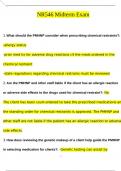Exam (elaborations)
NR546 Midterm Exam 2024/25 Prediction Questions (All correct Answers, Already Graded A)
- Course
- NR 546 / NR546
- Institution
- Chamberlain College Of Nursing
NR546 Midterm Exam 2024/25 Prediction Questions (All correct Answers, Already Graded A)
[Show more]



